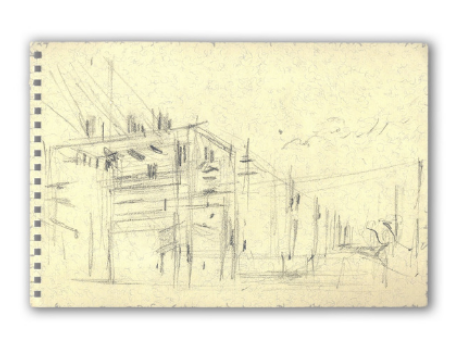In Their Own Words
Jeffrey Yang on “Circle”

Circle
Two specks in a breadth of prairie
grass tall through objective lenses
camels grazing, at leisure in the wind
They speak to one another silently
of the old days enslaved by the US
Army, hauling survey expeditions,
protecting the frontier for destiny's
manifest, training for operations
against Apaches or Mormons, shuttling
salt and mail for Confederate troops,
suffering illness, whippings, abuse
how they arrived in this new world
with their foreign smell and blobbish head,
called names like "noble and useful brutes,"
the experiments and tests lasting roughly
a decade, until the War Department
judged them impractical, and on to the next
chapter: the pageant of the auction block
One rubs its generous lips against the other's
neck, as they speak of stories passed down
of circuses and races, packing for prospectors,
of being let loose to wander the strange
empty range, alone, their silent words leap
farther back, to dark sea-crossings,
the howling gales, a death, three births
on board, what life would be living
through them, in their native Levantine lands,
or Alexandria, or Kusadasi, as beasts of burden,
wrestling spectacle, kiddie ride, while now,
here, half-wild on a ranch, to breed
or not to breed, one stoops its head down,
and with a forefoot marks the sand
They speak to one another silently
camels grazing, at leisure in the wind
grass tall through objective lenses
two specks in a breadth of prairie
From Hey, Marfa (Graywolf, 2018). All rights reserved. Reprinted with the permission of the author.
On "Circle"
Although camels originated in the New World millions of years ago, they eventually evolved, diverged, disappeared, and moved on to the Old World where they multiplied. Domesticated, they circled back and returned, riding into the sunset of human nature. Once, I saw a group of college boys try to ride a half-starved camel in the most wretched zoo I had ever been to. Alone and abused, the camel knelt in the dirt, too weak to stand, its gurgly roars falling upon deaf ears. In the enclosure beside it, emaciated deer ate dried leaves and spit them back out. Travelers passing through the American deserts will not meet any of our majora-lipped brethren roaming wild across the range. Driving along the 67 north of Ojinaga along La Entrada al Pacífico, for instance, the private ranchland vistas of yucca and creosote scrub seem to go on forever into the sky, from hills to valleys, plains to distant mountains, like an overgrazed hallucination. But diverse life dwells beneath the gaze. And if you're lucky you'll notice a stretch of tall springtime grass, a barbed-wired oasis of golden grass behind the barrier gate you pull up to and, taking out your binoculars to look for a stray aplomado falcon, you might, if your luck prevails, catch sight of our fatty-humped cohabitants striding slowly through the swaying grass, third eyelids open. They look so calm and peaceful lollygagging in the desert grasslands like mammalized turkeys. The breeze brings their silent conversation to your ears, and the poem tries to listen.


